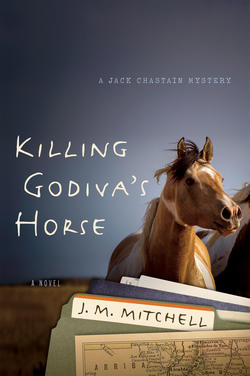Читать книгу Killing Godiva's Horse - J. M. Mitchell - Страница 21
На сайте Литреса книга снята с продажи.
ОглавлениеChapter
11
Jack Chastain sat staring at the white walls of the emergency room lobby. The uncomfortable plastic chair, the intermittent sirens, and the pulses of people coming and going—all seemed minor distractions. With Samuel called away to other duties, Jack sat thinking about the condition of the young poacher, wondering why he would take those kinds of chances, against rangers with AK-47s. Made no sense.
“Mr. Chastain?”
Jack jumped, startled at hearing his own name. He looked up to see a man in the aisle, a big man, nearly filling the space between rows of chairs. He wore a suit and green striped tie, his white shirt glistening against his skin. “That’s me,” Jack said.
“I know, Mr. Chastain.”
“How is he?”
“I am not a doctor, Mr. Chastain.”
Jack stood. “Obviously not a nurse.”
“No, I am not a nurse.” He crossed his arms and glared. “I am Under Secretary Mwangi, Ministry of Environment, Water and Natural Resources.”
“Samuel Leboo had to leave. Called away to other business.”
“I am not here to speak to Samuel Leboo, Mr. Chastain. I am here to speak to you.”
“Something wrong?”
“That depends. Should I be sending you home, Mr. Chastain?”
“Maybe. I’ve done things I promised my director I wouldn’t. And now, there’s a kid in a hospital because of me.”
“You shot him in the leg, Mr. Chastain.”
“I’ve never done anything like that before.”
“It is his leg. He is a poacher. He lives to poach another day.”
Jack shrugged. “I suppose, but why would he after this?”
“Let us talk, Mr. Chastain.” He swung an arm, gesturing toward the door.
Jack followed him through the door, down the hall, and out through an exit. Heavy traffic filled the street. Mwangi found a sidewalk and slowed to a stroll, locking his hands behind his back. “You asked why he would do that, Mr. Chastain. He is a poacher. That is what poachers do.”
“Why face off against rangers with automatic weapons?”
“You make it sound as if the odds are in the ranger’s favor? Do you understand what motivates the poacher, Mr. Chastain?”
“Not really. Rhino for its horn, elephant for ivory. That’s about it.”
“Rhinoceros horn sells for more than sixty-five thousand dollars per kilogram. That makes it more valuable than gold or cocaine, Mr. Chastain.”
“Why?”
“Demand. And superstition. The largest demand is from Asia. China and Viet Nam. Rhinoceros horn is used in traditional medicine and—more recently—as a cancer cure, despite the fact that research has shown it to have no medicinal benefit.”
“But this is Kenya. Why would Kenyans fall for someone else’s superstition?”
“Yes, this is Kenya. What is your point?” He waited, then continued. “Big money, Mr. Chastain. That is the reason. The Asia market is willing to pay big money. Rhinoceros horn and elephant tusk are also trophy. Long they’ve been valued in the middle east and other parts of the world, and we can only do what we can. The poachers are the little people. There is an endless supply of them. They do it for money, but it is those higher up the chain who benefit most. They are the ones who manage the flow to the markets, and reap the benefit of the big money. If they have people willing to provide a supply, and take all the risk—and there’s an endless supply of boys like the one that you shot willing to take that risk—then they can use their operation to generate big money. Some find ways to fund terrorism.” He paused. “Al-Shabaab and the Lord’s Resistance Army—terrorist organizations—use poaching to bring in millions to support their activities. Do you understand now, the difficulties we face?”
“Is the boy a terrorist? Can he be educated?”
“No, the boy is but a peasant. One of the little people,” Mwangi said, impatiently. “He would have no ideological connection whatsoever. And you did not hear me, Mr. Chastain. Our bigger concern is the market for Asia’s traditional medicine. Markets are powerful forces. Those in Asia do not want to be educated. Not by us. They want Kenya to provide. Product. Rhinoceros horn and elephant ivory.”
“Then, . . . what about . . . laws?”
Mwangi stopped and scanned the cityscape. He pointed. “What do you see there, Mr. Chastain?”
Jack looked down the road. “Uh, . . . a road . . . a traffic light . . . cars.”
“What color is the traffic light?”
“Red.”
“And what does that mean to you?”
“Stop.”
“Yes, and in your answer is the difference. In your country, red means stop. In Kenya, red is . . . maybe stop, maybe go. It is the same in other parts of the world, including parts of Asia.”
“Why would it mean both?”
“It doesn’t, Mr. Chastain. The difference is, in your society you have rule of law. In our country, we do not have the same rule of law. It is something very different. In your country, people stop when they see a red light. If they don’t, if they are caught, they go to traffic court. They pay a hefty fine. Your society understands its norms and accepts the consequences of not abiding by them. Here, that is not the case. If you drive through a red light, you may be stopped by a policeman, but you are more likely to pay a bribe than ever be forced into court or suffer a significant consequence. That is just the way it is.”
